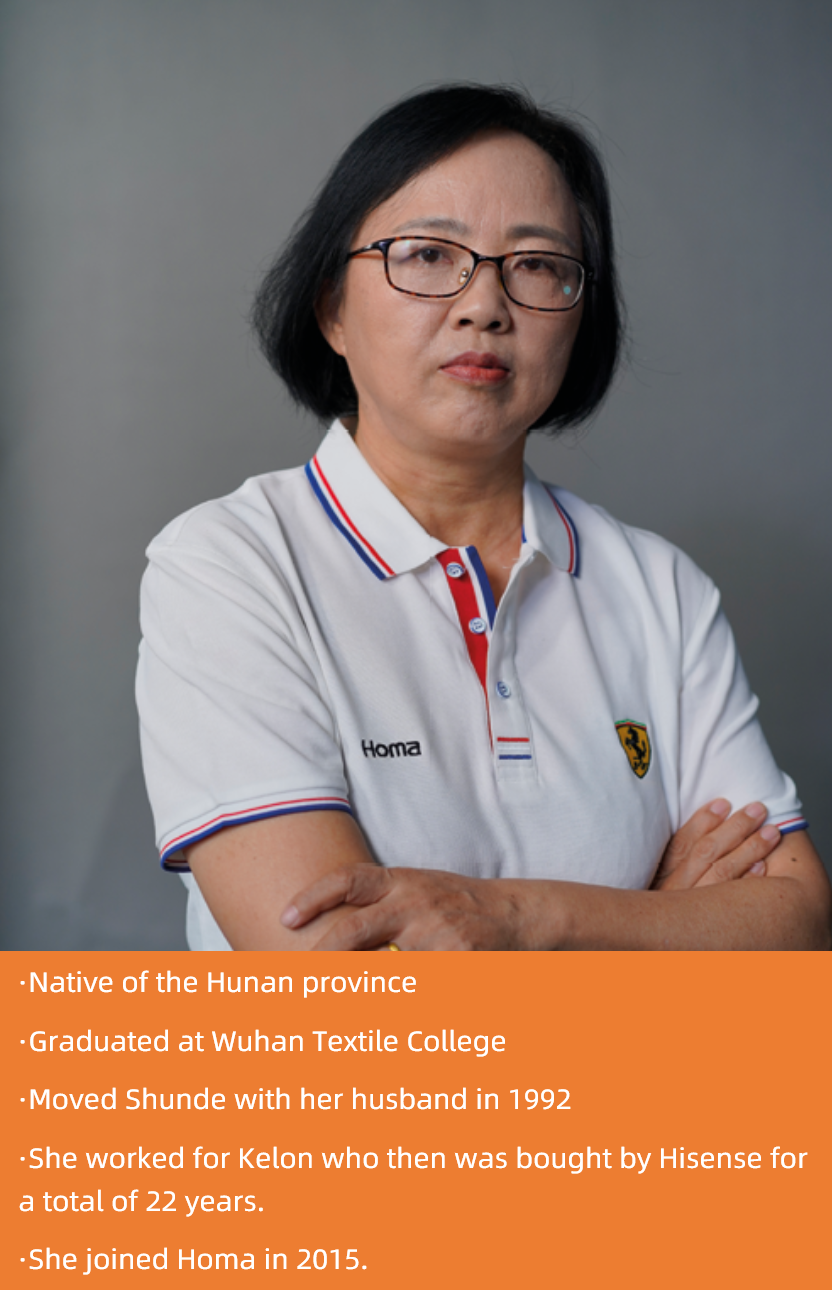
How did you decide to join Homa? And how do you see your role contributing to Homa’s vision?
I first worked for Hisense Kelon in the quality area for 22 years. I then joined Homa in 2015, I already knew a number of Homa’s leaders from being in the industry for such a long time, and I really appreciated Homa’s quality control approach.
I joined Homa at a key moment when the company was working to upscale, and at the same time putting a great effort into quality improvement. Such an effort obviously puts huge pressure on the whole quality team to meet those requirements. We set out our plans, and implemented them step by step. It’s been a tough process, but after these past seven or eight years, I can say that
Homa is now recognised for having good stable quality in the industry, especially in our high-end range.
Thanks to all our hard work, our customers truly appreciate the improvements we’ve made over recent years.
How do you ensure that clients’ feedback is taken into account and is used to improve quality? How does that process work?
Firstly, in Homa we have a special control team that connects our quality and our clients. This team receives complaints and other feedback from the clients. Second, we have a very specific and important annual process targeting quality improvement, through discussion and training. This process is at a company level, involving not just the quality department, but all the plants, the sales departments, and many others. The outcome of this process is the quality improvement plan for the following year.But what happens if we receive a complaint from a client? We have a very strict process to follow, with a time limit for when the improvement must be made, it could be three months for example, and how that will be carried out. Once we have made the improvement, we pass this information back to the client, asking for their feedback, their level of satisfaction, and so on. And lastly, we continue to pay attention to the specific issue or complaint, proactively researching the market to see if there are similar complaints, or related product improvement advice.
An extremely important point is the customer-centred attitude that we foster throughout the whole company. Our focus here is on understanding our products in the markets, which problems happen frequently, and what is the most concerning quality problem for our customers. This customer- centred focus gives us the chance to really standardise our quality systems and awareness across the whole company.How do you track and analyse data, other than customer feedback, to identify areas for improvement in the manufacturing process?
Our Manufacturing Execution System (MES) provides us with an excellent overview of the data in our manufacturing processes. An MES is a comprehensive, dynamic software system that monitors, tracks, documents, and controls the process of manufacturing goods from raw materials to finished products.
Responsibility for our MES lies with our IT department, and has been a crucial step in our processes of digitization and automation at Homa. Thanks to individual QR codes, via MES we can follow the journey of a product or part through the whole system. We use it to track and test our spare parts, and at important quality control points. MES is a great tool for working together with client feedback from the market to make manufacturing improvements. When we receive client feedback identifying a problem, with MES we can identify exactly where in the process the problem has arisen, and at a higher level, we can use this process to identify the top 5 problems that arise.
For example, what if there is a problem with a compressor in a refrigerator? We can scan the product and by reading the parts code, we can identify where in our process the problem lies, and who the supplier is. In this way, we can analyse all the relevant data on a large or a small scale.“This customer-centred focus gives us the chance to really standardise our quality systems and awareness across the whole company.”
Our company’s base line policy is always quality first.
Supplementing the MES, there are cameras along the production lines at various process points, so if something stops the line, there are alarms to provide feedback and quick intervention, ensuring high standards of quality and efficiency.
How do you establish strong relationships with other departments In Homa to ensure quality standards are applied, met and improved throughout the organization?
First of all, training for employees in all departments is very important to ensure a standard concept of quality throughout the company. In addition to this, there is also technical skills training for people from our different factories. Secondly, we have a monthly meeting with the directors of each department at which we share information on product performance in the market using clients’ feedback, including any serious problems they find.
This way, the directors are constantly updated on what needs to change and what can be better. Thirdly, we issue a constant stream of communication to all departments based on our clients’ feedback, so everyone is kept fully informed and updated. Fourth, if a problem arises concerning a specific problem, a special meeting is called outside the regular schedules to deal with the topic immediately. And last but not least, there is an audit system throughout the factories which is very important to evaluate whether a factory or department is meeting the quality standards and processes of the company.
How do you balance the need for quality with the need for speed and efficiency in the production process?
Our company’s base line policy is always quality first. Of course we need to produce high-end quality products in a short time, but we set an agreement with other departments with a fixed baseline for quality. We cannot compromise against time and efficiency. Based on the agreement we make with the relevant department, we monitor whether the manufacturing process really meets the terms of this agreement, or whether in the actual process, anything changesAre there any other points you would like to make about quality at Homa?
I’d like to emphasise that even as Homa has grown bigger and bigger over the last 20 years, everyone from the head of the organization to the employees in all parts of the factories agrees on the importance of quality, because only in this way can we keep our clients. Quality is what is important for them. Our hard work in this area helps us to make constant improvements, proved by the fact that in the last five years, our SCR (service call rate) has decreased by 60-70%. And we’re proud to say that our customers tell us that Homa leads in quality.
Can you tell us your perspective of being a woman in such a significant job in a Chinese company grown to international importance?
This is traditionally an industry with a majority of men in technical leadership positions, while Homa is rather different, with quite a high number of female leaders.
I think that women may bring more care and consideration to their work, with an ability to stand in other people’s shoes that helps to build relationships. In my job, I don’t only have to manage my own department, but I have to work with many others. This means being persuasive and also strong, because that is necessary to insist on the application of quality rules and standards across departments. It’s not an easy job, but as a woman I have found that I can meet the demands needed when I have to!
Copyright © Homa 2023
All rights reserved

.jpg?VGhlIFBlcmZlY3QgU2xvdC1pbijmraPnoa4pLmpwZw==)












.jpg?MTkyMHg3MjDvvIhkZXPvvIkuanBn)
.jpg?MTAyNHg3NDDvvIhkZXPvvIkuanBn)



















